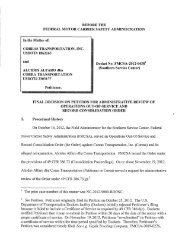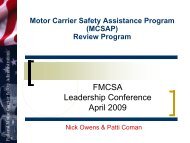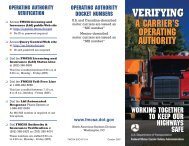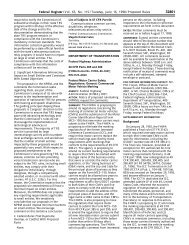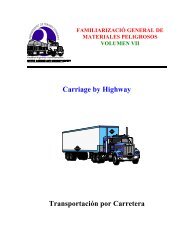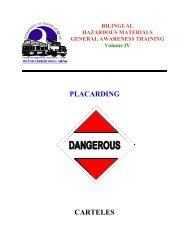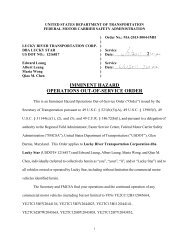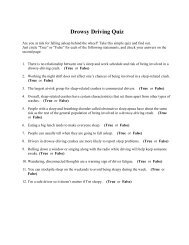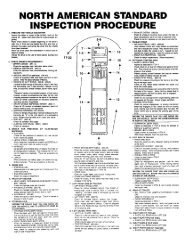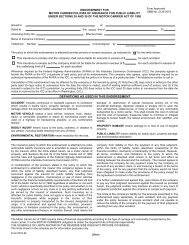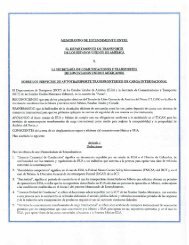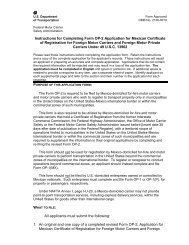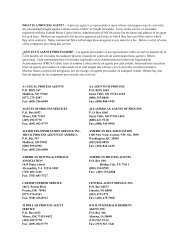Dear Sir/Madam - Federal Motor Carrier Safety Administration
Dear Sir/Madam - Federal Motor Carrier Safety Administration
Dear Sir/Madam - Federal Motor Carrier Safety Administration
You also want an ePaper? Increase the reach of your titles
YUMPU automatically turns print PDFs into web optimized ePapers that Google loves.
<strong>Federal</strong> Register / Vol. 69, No. 161 / Friday, August 20, 2004 / Rules and Regulations 51593<br />
believes open and timely<br />
communication provides an opportunity<br />
for ‘‘fair and adequate consideration of<br />
all partners’ ideas and concepts.’’<br />
New Jersey, Vermont, and New York<br />
DOT and DMV also expressed concern<br />
that States have an opportunity to learn<br />
of any proposal prior to FMCSA<br />
approval, so that they have an<br />
opportunity to understand, comment,<br />
and react appropriately.<br />
FMCSA Response: FMCSA is<br />
committed to its safety partnership with<br />
State agencies. State agencies play a<br />
vital role ensuring the safe operation of<br />
CMVs in the U.S. However, the agency<br />
does not plan to provide States with<br />
pre-notification of its decisions on<br />
waiver requests, exemption<br />
applications, pilot program proposals,<br />
nor engage in discussions or<br />
deliberations with State agencies about<br />
these matters, in a forum that is not<br />
open to public participation. Such<br />
actions would be inconsistent with the<br />
principles of the Administrative<br />
Procedure Act (5 U.S.C. 551 et. seq.).<br />
Discussions or deliberations between<br />
agency personnel and third parties that<br />
are intended to influence agency<br />
decisions, should be transparent.<br />
Limiting opportunity for comment to<br />
certain parties, while intentionally<br />
excluding all other interested parties,<br />
would be inappropriate.<br />
FMCSA continues to work with State<br />
agencies to ensure adequate notification<br />
of its decisions when the information is<br />
first made available to the general<br />
public. We continue to seek public<br />
comment on applications for<br />
exemptions and proposals for pilot<br />
programs through notice in the <strong>Federal</strong><br />
Register. The notice-and-comment<br />
procedure is in the public interest, so<br />
that all interested parties have an equal<br />
opportunity to comment.<br />
FMCSA does not expect State<br />
agencies to bear responsibility for<br />
implementing section 4007 of TEA–21.<br />
We welcome State participation, to the<br />
extent States have resources to assist<br />
FMCSA in monitoring the safety<br />
performance of persons who are granted<br />
waivers or exemptions, or are allowed to<br />
participate in pilot programs.<br />
As for FMCSA decisions to grant<br />
waivers and exemptions, or initiate pilot<br />
programs, the agency neither requires<br />
nor requests States to adopt compatible<br />
regulations, or to abandon more<br />
stringent safety regulations. First, the<br />
scope of waivers, exemptions and pilot<br />
programs is usually very limited in<br />
terms of the specific requirements for<br />
which alternative approaches to<br />
achieving safety are being considered.<br />
Second, the population of motor carriers<br />
and drivers is limited, usually through<br />
eligibility criteria for exemptions and<br />
pilot programs. In the case of waivers,<br />
the statutory requirement that waivers<br />
be issued only for non-emergency and<br />
unique events, and be limited in scope<br />
and circumstances, suggests that there<br />
will not be a large population of drivers<br />
or carriers covered by waivers at any<br />
given time. Given the statutory<br />
constraints, it is unlikely the agency<br />
would grant a waiver or exemption, or<br />
initiate a pilot program so broad in<br />
scope that States would be forced to<br />
amend or revise laws or regulations to<br />
accommodate those carriers and drivers<br />
covered by the waiver, exemption, or<br />
pilot program.<br />
As 49 U.S.C. 31315(d) provides, no<br />
State shall enforce any law or regulation<br />
that conflicts with or is inconsistent<br />
with a waiver, exemption, or pilot<br />
program while the waiver, exemption or<br />
pilot program is in effect. Therefore,<br />
preemption of State rules applies only<br />
with respect to persons operating under<br />
a waiver or exemption, or participating<br />
in a pilot program. This means all motor<br />
carriers and drivers not operating under<br />
a waiver or exemption, or participating<br />
in a pilot program, must continue<br />
complying with all applicable State<br />
laws and regulations. Amending or<br />
revising State laws or regulations would<br />
be impractical, since such amendment<br />
or revision would be limited to drivers<br />
or carriers operating under waiver,<br />
exemption, or pilot programs only. To<br />
amend or revise State motor carrier<br />
safety laws or regulations that result in<br />
less stringent requirements than the<br />
applicable FMCSRs would be<br />
inconsistent with the <strong>Motor</strong> <strong>Carrier</strong><br />
<strong>Safety</strong> AssistanceProgram (MCSAP)<br />
regulations, and, in some cases, would<br />
subject such rules to preemption<br />
pursuant to 49 U.S.C. 31141(c)(3). The<br />
agency’s MCSAP regulations (49 CFR<br />
Part 350) concern eligibility for <strong>Federal</strong><br />
funding to supportState motor carrier<br />
safety programs.<br />
Documentation of Waiver or Exemption<br />
Onboard CMVs<br />
Iowa believes the regulations should<br />
explicitly require that persons granted a<br />
waiver must carry documentation<br />
issued by the FMCSA and provide the<br />
documentation to State officials during<br />
any traffic stop or roadside inspection.<br />
Vermont requests that paperwork<br />
concerning the waiver or exemption be<br />
with the driver or carrier and available<br />
for review during roadside inspections.<br />
OOIDA believes it is important to adopt<br />
procedures and generate documentation<br />
for each waiver, exemption, or pilot<br />
program granted, so that carriers and<br />
drivers can be expeditiously identified<br />
to <strong>Federal</strong> and State enforcement<br />
VerDate jul2003 15:27 Aug 19, 2004 Jkt 203001 PO 00000 Frm 00047 Fmt 4700 Sfmt 4700 E:\FR\FM\20AUR1.SGM 20AUR1<br />
officials as participants in a <strong>Federal</strong><br />
program that exempts them from<br />
<strong>Federal</strong> and conflicting State motor<br />
carrier safety regulations.<br />
FMCSA Response: FMCSA agrees<br />
with the commenters. We usually<br />
require persons operating under the<br />
terms and conditions of waivers,<br />
exemptions, or pilot programs to carry<br />
copies of FMCSA-issued documents to<br />
identify them as such. The only<br />
exceptions to date have been<br />
exemptions granted to motor carriers<br />
operating certain vehicles manufactured<br />
by the Ford <strong>Motor</strong> Company (Ford) and<br />
General <strong>Motor</strong>s Corporation (GM),<br />
concerning fuel tank fill rates and<br />
certification labels on fuel tanks. 1 In<br />
those cases, the agency published<br />
information about the make, model and<br />
vehicle identification numbers (VINs) of<br />
the vehicles covered by the exemption.<br />
Since the vehicle manufacturers applied<br />
for the exemption on behalf of the<br />
customers operating the vehicles,<br />
developing a list of all vehicles and<br />
motor carriers operating these vehicles<br />
was unnecessary, given the nature of the<br />
exemption. FMCSA concluded that use<br />
of the make, model, and range of VINs<br />
was sufficient for enforcement<br />
personnel to determine whether a given<br />
vehicle was covered by the exemption.<br />
Driver Physical Qualifications<br />
Several commenters discussed the use<br />
of exemptions and pilot programs for<br />
driver physical qualifications. As EEOC<br />
stated:<br />
It is encouraging that the waiver and<br />
exemption provisions of section 4007 and<br />
[FMCSA’s] interim implementing regulations<br />
require individualized assessment of the<br />
safety-related qualifications of persons who<br />
otherwise would be denied employment<br />
opportunities pursuant to blanket categorical<br />
exclusions under the FMCSRs.<br />
Individualized assessment of qualifications is<br />
one of the hallmarks of the Americans with<br />
Disabilities Act [ADA]. Indeed, the ADA’s<br />
purposes include ensuring that qualified<br />
individuals with disabilities are not denied<br />
equal employment opportunity by virtue of<br />
exclusionary qualification standards.<br />
J.B. Hunt recommends that pilot<br />
programs should be initiated to allow<br />
motor carriers to investigate whether<br />
more stringent medical standards could<br />
improve public safety.<br />
Georgetown believes several of the<br />
physical standards, in particular hearing<br />
and vision, are discriminatory and<br />
violate the government’s obligations<br />
1 The exemption concerning fuel tank fill rates<br />
and certification labels for vehicles manufactured<br />
by Ford was published on December 20, 1999 (64<br />
FR 71184). The exemption concerning fuel tank fill<br />
rates and certification labels on vehicles<br />
manufactured by GM was published on April 26,<br />
2000 (65 FR 24531).



